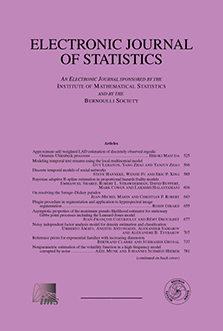Abstract
We consider the problem of Bayesian inference for changepoints where the number and position of the changepoints are both unknown. In particular, we consider product partition models where it is possible to integrate out model parameters for the regime between each changepoint, leaving a posterior distribution over a latent vector indicating the presence or not of a changepoint at each observation. The same problem setting has been considered by Fearnhead (2006) where one can use filtering recursions to make exact inference. However, the complexity of this filtering recursions algorithm is quadratic in the number of observations. Our approach relies on an adaptive Markov Chain Monte Carlo (MCMC) method for finite discrete state spaces. We develop an adaptive algorithm which can learn from the past states of the Markov chain in order to build proposal distributions which can quickly discover where changepoint are likely to be located. We prove that our algorithm leaves the posterior distribution ergodic. Crucially, we demonstrate that our adaptive MCMC algorithm is viable for large datasets for which the filtering recursions approach is not. Moreover, we show that inference is possible in a reasonable time thus making Bayesian changepoint detection computationally efficient.
Citation
Alan Benson. Nial Friel. "Adaptive MCMC for multiple changepoint analysis with applications to large datasets." Electron. J. Statist. 12 (2) 3365 - 3396, 2018. https://doi.org/10.1214/18-EJS1418





